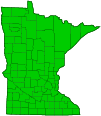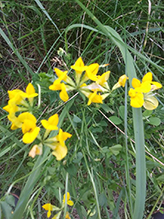bird’s-foot trefoil
(Lotus corniculatus var. corniculatus)
Conservation • Weed • Wetland • Description • Habitat • Ecology • Use • Distribution • Taxonomy
Description |
Bird’s-foot trefoil is an exotic perennial forb rising from a taproot. The stems either curve upwards from the base or lay flat, growing along the surface of the ground with their tips turned upwards. They are branched, hairless or sparsely hairy and up to 1½″ long. They occasionally root at the nodes. The leaves are alternate, clover-like, and mostly stalkless. They are divided into 5 equally sized and shaped, ¼″ to ¾″ long leaflets. The leaflets are untoothed, stalkless, and somewhat hairy. The two lower leaflets are separated from the upper 3 crowded leaflets, appearing at the point where the leaf stalk joins the stem. The inflorescence is a rounded, head-like cluster of flowers arising from more or less a single point. The flowers are stalked, with all of the stalks about the same length, forming a convex cluster (umbel). The clusters have 4 to 8 flowers each and rise from the upper leaf axils. The individual flowers are ⅓″ to ½″ long and bright yellow, tinged increasingly with red as they age, eventually becoming orange marked with brick red. It has 5 petals organized into the banner, wings, and keel that are typical of plants in the Pea family. The sepals are green and are united into a bell-shaped or cone-shaped tube. Their tips are elongated into teeth equal to half the length of the sepal. The fruit is a smooth, flattened, slender seed pod, ¾″ to 1½″ long, held horizontally from the flower stalk. |
Height |
6″ to 24″ |
Flower Color |
Bright yellow, becoming orange marked with brick red |
Similar Species |
The 5-parted leaf and the head-like umbel of bright flowers distinguish this plant from all other members of the Pea family. American bird’s-foot trefoil (Lotus unifoliolatus var. unifoliolatus), has solitary white flowers. |
Habitat |
Moist. Meadows, wet low places, roadsides, lawns, and disturbed sites. Full sun. |
Ecology |
Flowering |
June to August |
Pests and Diseases |
|
Use |
|
Distribution |
||
|
Sources |
|
| 7/2/2024 | ||
Nativity |
||
Native to northern and eastern Africa, Asia, Europe, and the Indian subcontinent. Introduced and naturalized in North America. |
||
Occurrence |
||
|
||
Taxonomy |
|
Kingdom |
|
Subkingdom |
Pteridobiotina |
Phylum |
Tracheophyta (Vascular Plants) |
Class |
|
Order |
Fabales (Legumes, Milkworts, and Allies) |
Family |
Fabaceae (Legumes) |
Subfamily |
Faboideae |
Tribe |
Loteae |
Genus |
Lotus (bird’s-foot trefoils) |
Species |
Lotus corniculatus (bird’s-foot trefoil) |
Subordinate Taxa |
|
|
|
Synonyms |
|
| Lotus corniculata var. corniculata | |
Common Names |
|
birdfoot deervetch bird’s-foot trefoil Bloomfell cat’s clover common bird’s-foot trefoil crowtoes ground honeysuckle |
|
Glossary
Axil
The upper angle where the leaf stalk meets the stem.
Umbel
A flat-topped or convex umbrella-shaped cluster of flowers or buds arising from more or less a single point, with all of the stalks about the same length.
Visitor Photos |
||
Share your photo of this plant. |
||
This button not working for you? |
||
Dan W. Andree |
||
 |
 |
|
Interesting Plant against a Boulder.... This is the plant that caught my attention out at the Northern Tallgrass Prairie NWR Pavia Unit 3-9-25. |
||
Luciearl |
||
 |
||
Alfredo Colon |
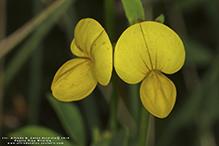 |
MinnesotaSeasons.com Photos |
||
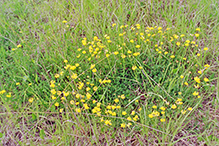 |
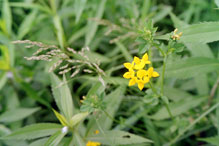 |
|
| Colony | Inflorescence | |
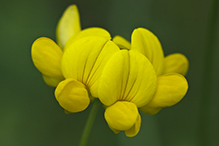 |
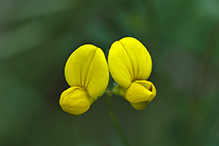 |
|
Flowers |
Flowers | |
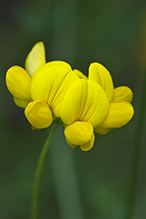
|
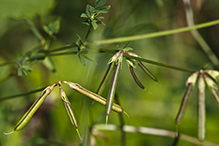 |
|
Infructescence |
||
|
||
|
||
Flowers |
||
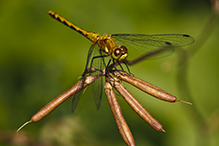 |
||
Infructescence |

Slideshows |
Birdsfoot Trefoil |
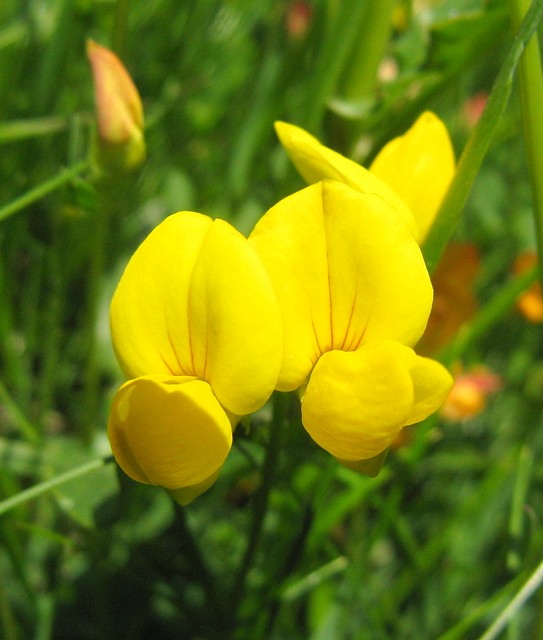
|
About
Birdsfoot Trefoil (Lotus corniculatus). |
Birdsfoot Trefoil (Lotus Corniculatus) |
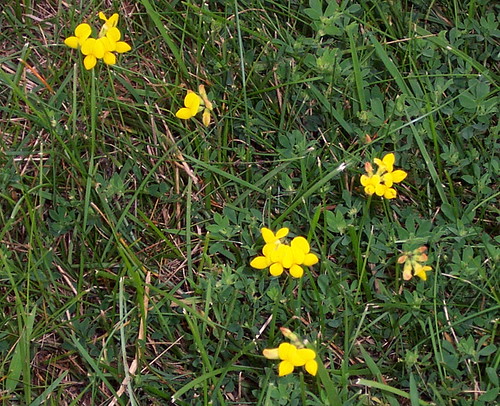
|

Visitor Videos |
||
Share your video of this plant. |
||
This button not working for you? |
||
|
Other Videos |
||
bird’s-foot trefoil (Lotus Corniculatus) - 2012-06-25 |
About
Published on Jun 27, 2012 Lotus corniculatus is a common flowering plant native to grassland temperate Eurasia and North Africa. The common name is bird’s-foot trefoil (or similar, such as "birdsfoot trefoil"), though the common name is often also applied to other members of the genus. It is also known in cultivation in North America as Birdfoot Deervetch. ---------------------- |

Visitor Sightings |
||
Report a sighting of this plant. |
||
This button not working for you? |
||
Dan W. Andree |
Location: Northern Tallgrass Prairie NWR, Pavia Unit This is the plant that caught my attention out at the Northern Tallgrass Prairie NWR Pavia Unit 3-9-25. |
 |
Luciearl |
Location: Fairview Twp. (on new trail freshly seeded) |
 |
| Alfredo Colon 8/2/2019 |
Location: Woodbury, Minnesota |
 |
MinnesotaSeasons.com Sightings |
||
Badoura Jack Pine Woodland SNA Bertram Chain of Lakes Regional Park Blazing Star Prairie Addition Preserve, South Unit Carpenter St. Croix Valley Nature Center Clifton E. French Regional Park Felton Prairie SNA, Shrike Unit Lake Alexander Woods SNA, South Unit Mary Schmidt Crawford Woods SNA Minnesota Valley NWR, Rapids Lake Unit Northern Tallgrass Prairie NWR, Pavia Unit Northern Tallgrass Prairie NWR, Spieker Unit P.N. and G.M. Nelson Wildlife Sanctuary Pembina Trail Preserve SNA, Crookston Prairie Unit Sand Prairie Wildlife Management and Environmental Education Area Spring Beauty Northern Hardwoods SNA |

|
Created: Last Updated: © MinnesotaSeasons.com. All rights reserved. |
